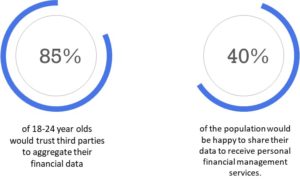
Why You Need To Be Concerned About Affordability
Despite tightening up regulations that protect consumers from over-indebtedness, insolvencies for 18 to 34 year olds are up by one third and the Bank of England predicts lenders writing off another £30bn of loans.[1]
Good conduct requires lenders to take into account the impact a loan would have on a borrower’s budget and ability to meet basic expenditure. An investigation by the Guardian into car finance found dealerships only asked the buyer what their monthly budget would be; there were no external checks whatsoever.[2]
Payday loan companies’ charges are capped, but a £500 loan still costs £800 over 26 weeks. The £140 per month required to service the debt represents more than 10% of the average take home pay for the bottom 10% of full time earners.[3] With one in six people saying that they cannot afford a £50 increase in bills, short-term lending is pushing more and more people into un-affordable debt.[4]
Expect new regulations
With an already fragile economy, regulators want lenders to do more to prevent over indebtedness. The IMF believes that a one percentage point increase in debt raises the odds of a future banking crisis by 1%.[5]
Affordability will be the big regulatory challenge for 2018. An FCA consultation on proposals to improve affordability will report in February 2018; the focus is on the need to design affordability rules which minimise financial distress. The research has found that data currently being used by lenders is unlikely to accurately estimate affordability; more needs to be done.[6]
The power of data
Traditional credit bureau data can help, but affordability decisions should be based much wider data sets. Open Banking, social media and the decentralisation of privacy (where the data subject releases their personal information in exchange for greater risk taking by a lender) all present opportunities.
Research by Ipsos Mori in 2015 showed that 40% of the population would be happy to share their data to receive personal financial management services. The following year, Accenture found that 85% of 18-24 year olds would trust third parties to aggregate their financial data.[7]

If lenders have a broader view of people’s spending patterns, affordability assessments are more effective. Access to a person’s transactional data allows companies to continuously assess creditworthiness, affordability and ability to make future payments. Wider use of data can help consumers with thin credit files who often end up paying the most for credit and related services. And if the release of such data is agreed by the data subject in return for additional products and services, new regulatory requirements can be met without the erosion of privacy.
To keep up with thinking on this and similar subjects subscribe for updates below.
[1] The Guardian Bank of England warns a consumer debt crisis could cost banks £30bn 25th September 2017
[2] The Guardian Car finance: the fast lane to debt? 19th September 2017
[3] Allthelenders.org.uk accessed 23rd October 2017. Office of National Statistics (2016) Employment and Labour Market
[4] Financial Conduct Authority (2017) Financial Lives
[5] Nico Valckx (2017) Rising Household Debt: What It Means for Growth and Stability International Monetary Fund
[6] Financial Conduct Authority (2017) Assessing Creditworthiness in Consumer Credit CP17/27
[7] Faith Reynolds (2016) Open Banking: A Consumer Perspective
